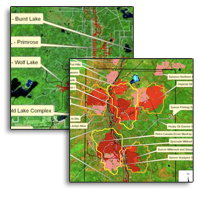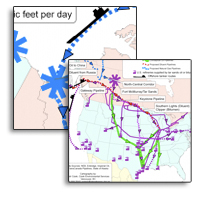Tar Sands 101
The Tar Sands "Gigaproject" is the largest industrial project in human history and likely also the most destructive. The tar sands mining procedure releases at least three times the CO2 emissions as regular oil production and is slated to become the single largest industrial contributor in North America to Climate Change.
The tar sands are already slated to be the cause of up to the second fastest rate of deforestation on the planet behind the Amazon Rainforest Basin. Currently approved projects will see 3 million barrels of tar sands mock crude produced daily by 2018; for each barrel of oil up to as high as five barrels of water are used.
Human health in many communities has seriously taken a turn for the worse with many causes alleged to be from tar sands production. Tar sands production has led to many serious social issues throughout Alberta, from housing crises to the vast expansion of temporary foreign worker programs that racialize and exploit so-called non-citizens. Infrastructure from pipelines to refineries to super tanker oil traffic on the seas crosses the continent in all directions to allthree major oceans and the Gulf of Mexico.
The mock oil produced primarily is consumed in the United States and helps to subsidize continued wars of aggression against other oil producing nations such as Iraq, Venezuela and Iran.
To understand the tar sands in more depth, continue to our Tar Sands 101 reading list
Tarsands are an addiction
Tarsands are an addiction
By SILVER DONALD CAMERON
Sun. Mar 15 - 6:22 AM
THE ALBERTA tarsands, says Andrew Nikiforuk, represent "a nation-changing event" which has made the rest of Canada into "a suburb of Fort McMurray." A distinguished Calgary-based journalist, Nikiforuk was in Nova Scotia in early March to discuss his new book, Tar Sands: Dirty Oil and the Future of a Continent (Greystone, $20).
TransCanada files plans for its second [Keystone] oil pipeline
TransCanada files plans for its second oil pipeline
By Bob Mercer
State Capitol Bureau
PIERRE -- TransCanada Keystone Pipeline company has applied to the state Public Utilities Commission for a permit to construct its second crude-oil pipeline through South Dakota, this time through the sparsely populated ranch country west of the Missouri River.
The Calgary-based company’s construction timetable calls for work to begin in South Dakota in 2011 and service to begin in 2012, with a peak construction work force of up to 1,400 people during the months of May through August of 2011.
Suncor, contractors charged with dumping into Athabasca
Suncor, contractors charged with dumping into Athabasca (article one of two)
JEFF CUMMINGS, METRO EDMONTON
March 11, 2009
Oilsands powerhouse Suncor and two of its contractors have been charged under Alberta’s Environmental Protection and Enhancement Act with 90 counts of dumping poorly treated sewage water into the Athabasca River.
The companies, which were all charged back in February 2008, are also accused of providing misleading and false information to the province for two years at Suncor’s work camp north of Fort McMurray.
Trinidad and Tobago to study tar sands viability
Trinidad and Tobago to study tar sands viability
Curtis Williams
OGJ Correspondent
PORT OF SPAIN, Mar. 10 -- Trinidad and Tobago has awarded a license to Petroleum Co. of Trinidad and Tobago Ltd. to explore tar sands at Parrylands-Guapo fields, which are thought to contain 2 billion bbl of oil. The fields are just south of the La Brea Pitch Lake.
Canada’s carbon sink has sprung a leak
Canada’s carbon sink has sprung a leak
Until recently, its vast forests vacuumed up carbon dioxide. Now that process has been thrown in reverse.
By Mark Clayton | Staff writer of The Christian Science Monitor/ March 10, 2009 edition
Reporter Mark Clayton discusses the dilemma facing Canadian foresters and climate scientists: is it worse to cut trees threatened by beetle infestation, or to allow them to remain in a natural state?
‘Tar sands are killing us’
‘Tar sands are killing us’
Cree, Metis, Dene tell Sen. John Kerry
By Kate Harries, Today correspondent
Story Published: Mar 11, 2009
TORONTO – Dene, Cree and Metis activists from First Nations affected
by Alberta tar sands development made themselves heard in Washington
as Canadian Environment Minister Jim Prentice was making the rounds of
Capitol Hill.
They hand-delivered a letter to Sen. John Kerry, D-Mass., head of the
powerful Foreign Relations Committee, and later about 50 young people
Military keeping low profile during 2010 Olympics
Military keeping low profile during 2010 Olympics
By: Jennifer Ditchburn, THE CANADIAN PRESS
2/03/2009
OTTAWA - The Canadian military wants to keep a low profile when it comes
to the Vancouver 2010 Olympic Winter Games, and that includes keeping its
budget in check and out of the headlines.
Vice-Admiral Dean McFadden, commander of Canadian military operations at
home, underlined to a Commons committee Monday that "Operation
Podium" has so far stayed within its budget of $212 million for
specific military duties.
"Secret documents reveal sweeping new rules for natives"
Secret documents reveal sweeping new rules for natives
Native leaders warned Ottawa not to re-open the governance file unless it's willing to hold wide-ranging consultations but classified papers show government moving ahead
BILL CURRY
Globe and Mail
March 3, 2009
OTTAWA — The federal government is secretly planning an overhaul of the rules governing Canada's reserves that is far more sweeping than what Ottawa is telling Canada's chiefs and native leaders.
Rex Weyler-- Climate Alarm: Scientists call emergency meeting
Climate Alarm: Scientists call emergency meeting
March 2nd, 2009
Last summer, for the first time in human history, boats could circumnavigate the North Pole. To the oblivious observer, this might seem like a good thing. Perhaps some green entrepreneur will build resorts on Finland’s Svalbard Islands. However, as we know, there’s a dark side.
Alberta urged to halt oilpatch water use
Alberta urged to halt oilpatch water use
By Hanneke Brooymans,
Canwest News Service
February 9, 2009
A water-scarce future means Alberta should switch from coal-fired power to renewable energy, dismiss the idea of nuclear power, and dramatically reduce the oilpatch's water use by 2020, says a new Pembina Institute report.
One-third of all water allocated in the province in 2007 was for energy production, says the report, being released today.



